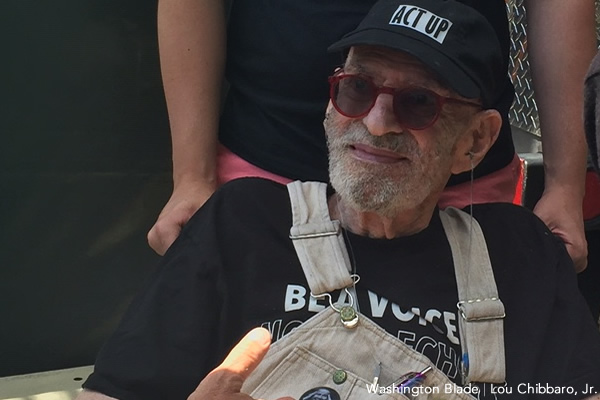
Larry Kramer at the Queer Liberation March in 2019. (Washington Blade photo by Lou Chibbaro, Jr.)
May 27 will mark one year since Larry Kramer’s passing at age 84 and our loss of one of the most influential leaders in the LGBTQ+ community. With the coming of the annual Pride celebrations in June, we must remember the impact Larry had in the fight against AIDS and the struggle for our rights.
Larry was an accomplished man earning a degree from Yale, an Academy Award nomination as a screenwriter, two-time Obie winner, Pulitzer Prize nominee, and activist. Born in a time when being out was unheard of and the role models we have today did not exist, he had his own struggles with coming to terms with and accepting himself as a gay man as many did and still do. Going as far as attempting suicide while in college, Larry would come to terms with who he was and go on to lead a movement that would change our world.
While not initially interested in activism, Larry would become a leader in the gay rights movement and the fight against AIDS when gay men began to get sick in 1980 with a then-unknown disease. Larry was instrumental in so many ways, from forming the first AIDS organization, which would become the Gay Men’s Health Crisis (GMHC), to ACT UP in 1987 after years of the government and the world turning a blind eye to what was happening. Larry forced gay men, the government, and mainstream news to pay attention and respond to the AIDS crisis, starting with his lengthy essay entitled “1,112 and counting,” of which Pulitzer Prize winner Tony Kushner said, “With that one piece, Larry changed my world. He changed the world for all of us.” Indeed, he did.
Larry exemplified what it means to stand up and take action even when that makes you unpopular and a target. While many stood back because they were afraid of being outed in a time when we had few, if any, rights, Larry said no. He stepped forward, mobilizing a movement that would bring forth money for research to fight AIDS. He would not let all those that had died and were suffering do so in vain. Widely criticized for his methods even by the gay community, GMHC ousted him in 1983 due to his “in your face” approach; that approach resulted in the intended outcomes. People and the government took notice and took action. Larry knew someone had to do something, and he did.
“You’d think one day we’d learn. You don’t get anything unless you fight for it, united and with visible numbers,” he once said.
While we now know that HIV had probably been around for decades, it was not until 1981 that the virus seemed to take hold and spread. If you were born after 1981, chances are you don’t know what effect the disease had back then, the toll it was taking. I was 14, and I remember clearly the fear that permeated the gay community and the lack of response or even acknowledgment of the government to do something because it was that “gay disease.” I remember my fear as a young gay man, seeing all those who were sick, dying, or who had passed. Had those infected with HIV been white straight men, things would have been much different. Now more than ever, that fact is not lost on me when I see the world’s response to the COVID pandemic compared to what happened back then.
Had it not been for Larry and others like him, we would be in a very different place today. Renowned immunologist Anthony Fauci said of Larry, “In American medicine, there are two eras. Before Larry and after Larry.”
Larry’s life and courage should be a catalyst for our own response to the lack of leadership in our country, to the continued and pervasive racism and bigotry that still exists, the inequality and injustice targeting anyone. Larry’s passing should be a call for action, so we do not let all those who have gone before us, who have sacrificed, risked, and even lost their lives to have done so in vain.
Larry’s legacy should remind us that the rights we have gained are fragile and can easily be stripped away as we continue to see. Leadership comes in many forms and people, but most often, it comes from those we least expect.
Anthony Eaton is a writer whose work has been featured in QNotes, Harlem World Magazine, The Georgia Voice, and Windy City Times, among others.

